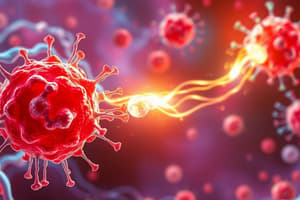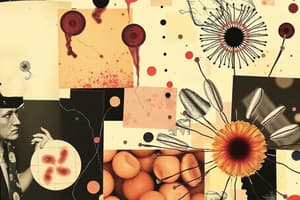Podcast
Questions and Answers
What is the necessary signal 1 for T cells?
What is the necessary signal 1 for T cells?
- Expression of costimulators
- Secretion of cytokines
- APCs reacting to microbes
- Antigen recognition by the T cell (correct)
What substance acts on APCs, through a TLR, and stimulates the expression of costimulators and the secretion of cytokines?
What substance acts on APCs, through a TLR, and stimulates the expression of costimulators and the secretion of cytokines?
- Lipopolysaccharide (LPS) (correct)
- MHC-restricted CD4+ T cells
- Protein antigens
- Memory cells
What is part of the innate immune response to different microbial products?
What is part of the innate immune response to different microbial products?
- Expression of costimulators (correct)
- Cytokine secretion
- Antigen recognition
- The two-signal hypothesis
What is the role of costimulators and cytokines in concert with antigen recognition by the T cell?
What is the role of costimulators and cytokines in concert with antigen recognition by the T cell?
What is the specificity of mucosal associated invariant T cells (MAIT cells)?
What is the specificity of mucosal associated invariant T cells (MAIT cells)?
Which type of cells recognize a wide variety of molecules, some displayed by class I–like molecules and others apparently requiring no specific processing or display?
Which type of cells recognize a wide variety of molecules, some displayed by class I–like molecules and others apparently requiring no specific processing or display?
What do proteins produced in the cytosol of infected and tumor cells, or that enter the cytosol from phagosomes, bind to?
What do proteins produced in the cytosol of infected and tumor cells, or that enter the cytosol from phagosomes, bind to?
Which molecules perform the function of displaying peptides derived from protein antigens?
Which molecules perform the function of displaying peptides derived from protein antigens?
What ensures that T cells respond to microbial antigens and not to harmless, nonmicrobial substances?
What ensures that T cells respond to microbial antigens and not to harmless, nonmicrobial substances?
What activates APCs to express membrane proteins (costimulators) and to secrete cytokines that provide signals that function in concert with antigens to stimulate specific T cells?
What activates APCs to express membrane proteins (costimulators) and to secrete cytokines that provide signals that function in concert with antigens to stimulate specific T cells?
Flashcards are hidden until you start studying
Study Notes
Signal 1 for T Cells
- The necessary signal 1 for T cells is antigen recognition.
Innate Immune Response
- Toll-like receptors (TLRs) recognize different microbial products and stimulate the expression of costimulators and the secretion of cytokines in Antigen-Presenting Cells (APCs).
Costimulators and Cytokines
- Costimulators and cytokines work in concert with antigen recognition by the T cell to stimulate a response.
- Costimulators are expressed on the surface of APCs and provide a second signal to T cells.
- Cytokines are secreted by APCs and provide a third signal to T cells.
Mucosal Associated Invariant T (MAIT) Cells
- MAIT cells are specific for a limited set of microbial antigens presented by the non-polymorphic MHC class I-like molecule, MR1.
Recognition of Molecules
- A wide variety of molecules, including those displayed by class I–like molecules and those requiring no specific processing or display, are recognized by gamma delta T cells.
Proteins Produced in Cytosol
- Proteins produced in the cytosol of infected and tumor cells, or that enter the cytosol from phagosomes, bind to MHC class I molecules.
Displaying Peptides
- MHC molecules perform the function of displaying peptides derived from protein antigens.
Ensuring Specificity
- The recognition of microbial products by TLRs and other pattern recognition receptors ensures that T cells respond to microbial antigens and not to harmless, non-microbial substances.
Activation of APCs
- TLRs activate APCs to express membrane proteins (costimulators) and to secrete cytokines that provide signals that function in concert with antigens to stimulate specific T cells.
Studying That Suits You
Use AI to generate personalized quizzes and flashcards to suit your learning preferences.



